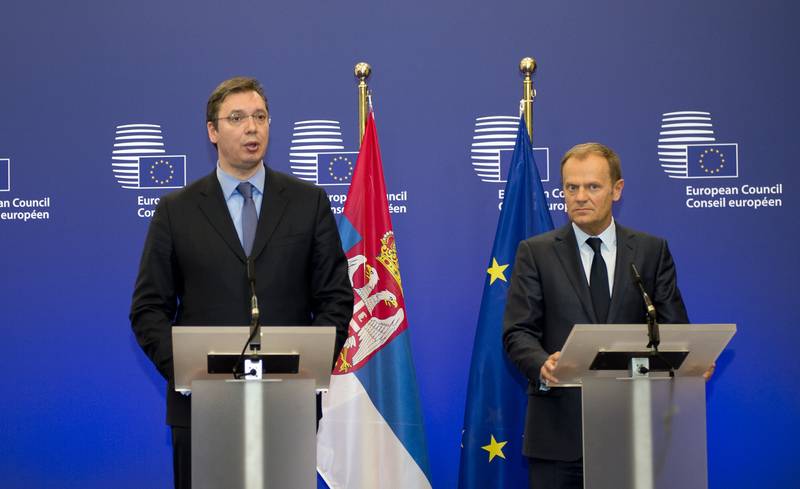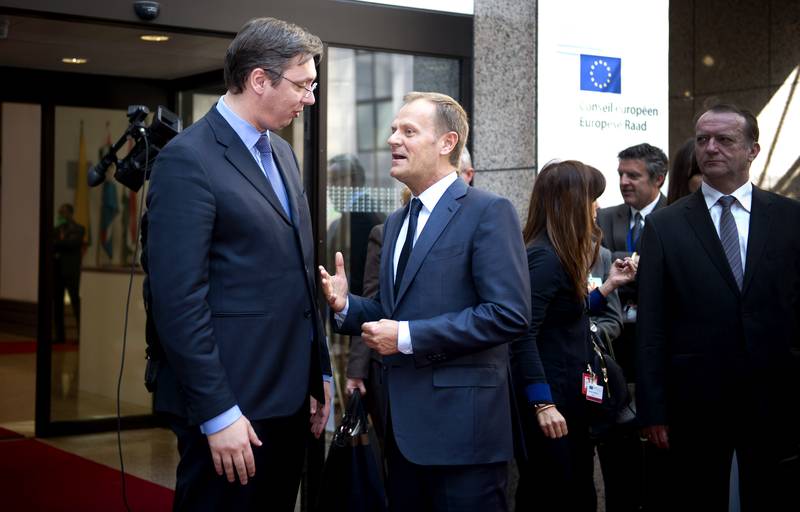Serbia Is Starting To Lose Patience with EU
Adelina Marini, April 23, 2015
 Serbia and EU are in a stalemate and unless an exit is found this could prove another huge geopolitical challenge for the EU. Because of the non-starting of accession negotiations with EU Belgrade is now visibly losing patience. This has become crystal clear during the meeting on 21 April between European Council President Donald Tusk and Serbia Prime Minister Alexander Vucic. The two made brief statements for the press without any questions from journalists. The difference between them, however, was easy to notice. The former premier of Poland, Tusk, seemed, as usually, welcoming and smiling no matter that he said two very serious things. One was that Serbia's future in the EU is as important for the Balkan state as it is for EU. In the same time, though, it is crucial the Serbian foreign policy to be guided by its main strategic goal, which is EU membership. This is an unequivocal warning that Serbia's EU membership is now formally being bound to imposing sanctions against Russia.
Serbia and EU are in a stalemate and unless an exit is found this could prove another huge geopolitical challenge for the EU. Because of the non-starting of accession negotiations with EU Belgrade is now visibly losing patience. This has become crystal clear during the meeting on 21 April between European Council President Donald Tusk and Serbia Prime Minister Alexander Vucic. The two made brief statements for the press without any questions from journalists. The difference between them, however, was easy to notice. The former premier of Poland, Tusk, seemed, as usually, welcoming and smiling no matter that he said two very serious things. One was that Serbia's future in the EU is as important for the Balkan state as it is for EU. In the same time, though, it is crucial the Serbian foreign policy to be guided by its main strategic goal, which is EU membership. This is an unequivocal warning that Serbia's EU membership is now formally being bound to imposing sanctions against Russia.
Prime Minister Vucic was a complete contrast to the European president. He seemed either very tired or very bored. He measured his words very carefully without reading from a prepared statement as is his usual practise. Again, unlike Donald Tusk who read out a carefully worded statement. Vucic tried to speak the language of Europe pointing out that Serbia is working intensively and is doing well in tackling its fiscal deficit, the public debt and, generally, the sustainability of its economy. All of these issues that dominate the European public domain and are now important for Serbia as well, as the European Semester applies to the candidate countries, too. He agreed with Donald Tusk's conclusion that Serbia has a lot more to do for the rule of law.
However, on this issue a particular hue could be observed. The former secretary general of the Serbian Radical Party, founded by Vojislav Seselj, said that he completely agrees with the assessment regarding the rule of law, "the legal state or whatever you call it, the rules and procedures". For legal state he used the German term rechststaat. The fact that it was irrelevant to him how exactly will this be called reveals some disregard for one of the foundations which the EU has been built upon. Mr Vucic completely ignored the issue about Serbia's foreign policy orientation but said instead that he expected the first negotiation chapters to be opened in June because, in his words, Serbia deserves this because of the excellent screening process and because of the continuation of the dialogue with Pristina.
"Whether this will happen in June is not up to us but I have to say that we, from Serbia, do things that we actually deserve it", Mr Vucic added. Yesterday, in Subotica, he said that he expected to become clear yet in May whether the Council would agree the real negotiations to begin. Serbia expected the opening of the first chapters, especially 23 and 24, in December last year but not only this did not happen but EU did not even commit to a specific date. Moreover, the General Affairs Council pointed out clearly that Serbia is expected to align its foreign policy with the EU which is a demand under cover Serbia to impose sanctions on Russia. Something Belgrade is tenaciously refusing. Alexander Vucic's government is completely convinced that it is possible to keep both its good relations with Russia and in the same time to get closer to EU.
Given the seriously deteriorated relations between EU and Russia, this is not an option Brussels can accept. The problem is, however, that this stalemate hides some serious risks. The Serbian government so far demonstrated complete dedication to the European process but in the same time the attitudes of many in Serbia are that a membership should not come at any price, especially if that includes a deterioration of relations with "brotherly Russia".
 Serbia formally started negotiations on 21 January last year but without the opening of specific chapters. As an informal beginning of the real negotiations process is deemed the opening of chapters 23 and 24. They cover the political criteria that are toughest to fulfil in the region like the rule of law, media independence, human rights, rights of minorities, etc. After the accession of Bulgaria and Romania, which joined the EU unprepared and with a special mechanism, the European Commission has changed the approach. The new approach is being applied for the first time with Montenegro which started the accession negotiations precisely from chapter 23 and 24. The aim of this new approach is the most difficult chapters to be opened in the very beginning of the negotiations and to be closed last when it is clear that not only the necessary legislation is in place but that the mechanism of the legal state is activated. This means that there are guarantees that the rule of law is introduced.
Serbia formally started negotiations on 21 January last year but without the opening of specific chapters. As an informal beginning of the real negotiations process is deemed the opening of chapters 23 and 24. They cover the political criteria that are toughest to fulfil in the region like the rule of law, media independence, human rights, rights of minorities, etc. After the accession of Bulgaria and Romania, which joined the EU unprepared and with a special mechanism, the European Commission has changed the approach. The new approach is being applied for the first time with Montenegro which started the accession negotiations precisely from chapter 23 and 24. The aim of this new approach is the most difficult chapters to be opened in the very beginning of the negotiations and to be closed last when it is clear that not only the necessary legislation is in place but that the mechanism of the legal state is activated. This means that there are guarantees that the rule of law is introduced.
This is precisely why Serbia insists so much on the opening of chapters 23 and 24. Last year, however, after the ostentatious military parade in honour of Russia President Vladimir Putin, Alexander Vucic's government was aware that it is very unlikely to get what it wants which is why it lowered its expectations and hoped "at least" the chapter on trade to be opened.
In the current geopolitical moment, the EU's demand Serbia to align its foreign policy with EU's is completely justified. In the same time, however, if it is true that if Serbia imposed sanctions on Russia this could lead to stoppage of gas deliveries, of trade and other problems, as Serbia's chief negotiator with EU Tanja Miscevic said at a conference in Zagreb recently, the EU should address these fears. The current situation is a tipping geopolitical point for the EU which requires a lot of precision, wisdom and vision. Without Serbia the Balkans will remain a problematic region and Europe has sufficient historical experience to know that this is not good for the stability of the continent.
 Bakir Izetbegovic, Andrej Plenkovic | © Council of the EU
Bakir Izetbegovic, Andrej Plenkovic | © Council of the EU Aleksandar Vucic, Recep Tayyip Erdogan | © Serbian Presidency
Aleksandar Vucic, Recep Tayyip Erdogan | © Serbian Presidency Jean-Claude Juncker, Zoran Zaev | © European Commission
Jean-Claude Juncker, Zoran Zaev | © European Commission